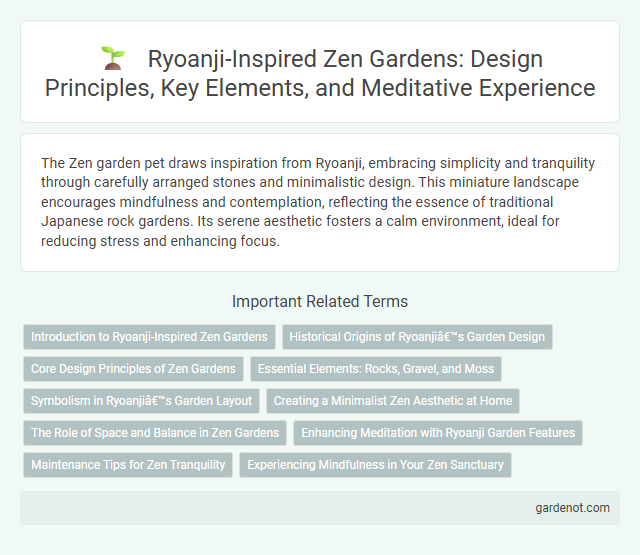The Zen garden pet draws inspiration from Ryoanji, embracing simplicity and tranquility through carefully arranged stones and minimalistic design. This miniature landscape encourages mindfulness and contemplation, reflecting the essence of traditional Japanese rock gardens. Its serene aesthetic fosters a calm environment, ideal for reducing stress and enhancing focus.
Introduction to Ryoanji-Inspired Zen Gardens
Ryoanji-inspired Zen gardens emphasize simplicity, balance, and the mindful arrangement of rocks, gravel, and moss to evoke tranquility and contemplation. These gardens reflect the principles of wabi-sabi, highlighting imperfection and transience while guiding meditation through minimalist design. Influenced by the famous Ryoanji Temple rock garden in Kyoto, they serve as spiritual retreats that foster inner peace and heightened awareness.
Historical Origins of Ryoanji’s Garden Design
Ryoanji Garden, originating in the late 15th century during Japan's Muromachi period, embodies Zen Buddhist principles of simplicity and meditation. Its design reflects the influence of Zen master Muso Soseki and the integration of karesansui (dry landscape) elements, emphasizing rocks and gravel to evoke tranquility and contemplation. The garden's historical roots highlight a deliberate arrangement aimed at fostering spiritual reflection and inspiring mindfulness through minimalistic aesthetics.
Core Design Principles of Zen Gardens
Ryoanji Zen Garden exemplifies core design principles such as simplicity, balance, and mindfulness, creating a meditative space through carefully arranged rocks and minimalistic gravel patterns. The garden's asymmetrical layout and use of empty space evoke tranquility and encourage introspection, embodying the essence of Zen philosophy. These elements reflect the principle of wabi-sabi, appreciating imperfection and impermanence in serene, natural compositions.
Essential Elements: Rocks, Gravel, and Moss
Ryoanji's Zen garden inspiration centers on the essential elements of rocks, gravel, and moss, which collectively symbolize natural harmony and simplicity. The 15 carefully placed rocks represent islands, mountains, or animals, while the meticulously raked gravel evokes flowing water, enhancing meditative focus. Moss adds a contrasting softness and vitality, connecting the garden to the passage of time and seasonal changes.
Symbolism in Ryoanji’s Garden Layout
Ryoanji's garden layout epitomizes minimalism through its fifteen carefully placed rocks representing islands floating in a sea of white gravel, symbolizing tranquility and meditation. The arrangement reflects Zen Buddhist principles, where empty space signifies infinite potential and encourages introspection. Each element is meticulously positioned to evoke harmony and balance, fostering a deeper spiritual connection within the viewer.
Creating a Minimalist Zen Aesthetic at Home
Ryoanji Temple in Kyoto exemplifies minimalist Zen aesthetics through its carefully arranged rocks and raked gravel, symbolizing simplicity and tranquility. Emulating this design at home involves selecting natural materials like stones, sand, and sparse greenery to create a serene, clutter-free space. Incorporating asymmetry and open space enhances mindfulness, promoting a calm and contemplative atmosphere.
The Role of Space and Balance in Zen Gardens
Ryoanji's Zen garden exemplifies the essential role of space and balance, where carefully placed rocks and raked gravel create a harmonious, contemplative environment that encourages mindfulness. The deliberate use of empty space, known as "ma," amplifies the garden's simplicity and tranquility, allowing observers to experience a profound sense of calm and introspection. This balance between elements embodies Zen principles, fostering a meditative state through minimalism and spatial awareness.
Enhancing Meditation with Ryoanji Garden Features
The Ryoanji garden's minimalist design, featuring carefully placed rocks and raked gravel, creates a tranquil environment that enhances focused meditation. Its asymmetrical layout encourages mindfulness by inviting observers to contemplate each element's symbolic meaning. The garden's simplicity and natural materials foster a deep sense of inner peace and clarity during meditation sessions.
Maintenance Tips for Zen Tranquility
Ryoanji Temple's Zen garden exemplifies minimalist design and precise stone placement, inspiring maintenance that emphasizes simplicity and balance. Regular raking of gravel patterns preserves the garden's meditative flow and prevents debris accumulation, essential for sustaining Zen tranquility. Pruning sparse greenery and moss upkeep enhance natural harmony, ensuring the garden remains a peaceful reflection of Zen philosophy.
Experiencing Mindfulness in Your Zen Sanctuary
Ryoanji's iconic Zen garden inspires the practice of mindfulness by encouraging deep contemplation within its minimalist stone and gravel arrangement. Each carefully placed rock symbolizes an island of tranquility, guiding visitors to focus their awareness on the present moment. Experiencing this serene sanctuary fosters inner calm and enhances mental clarity through mindful observation and reflection.
Ryoanji inspiration Infographic

 gardenot.com
gardenot.com